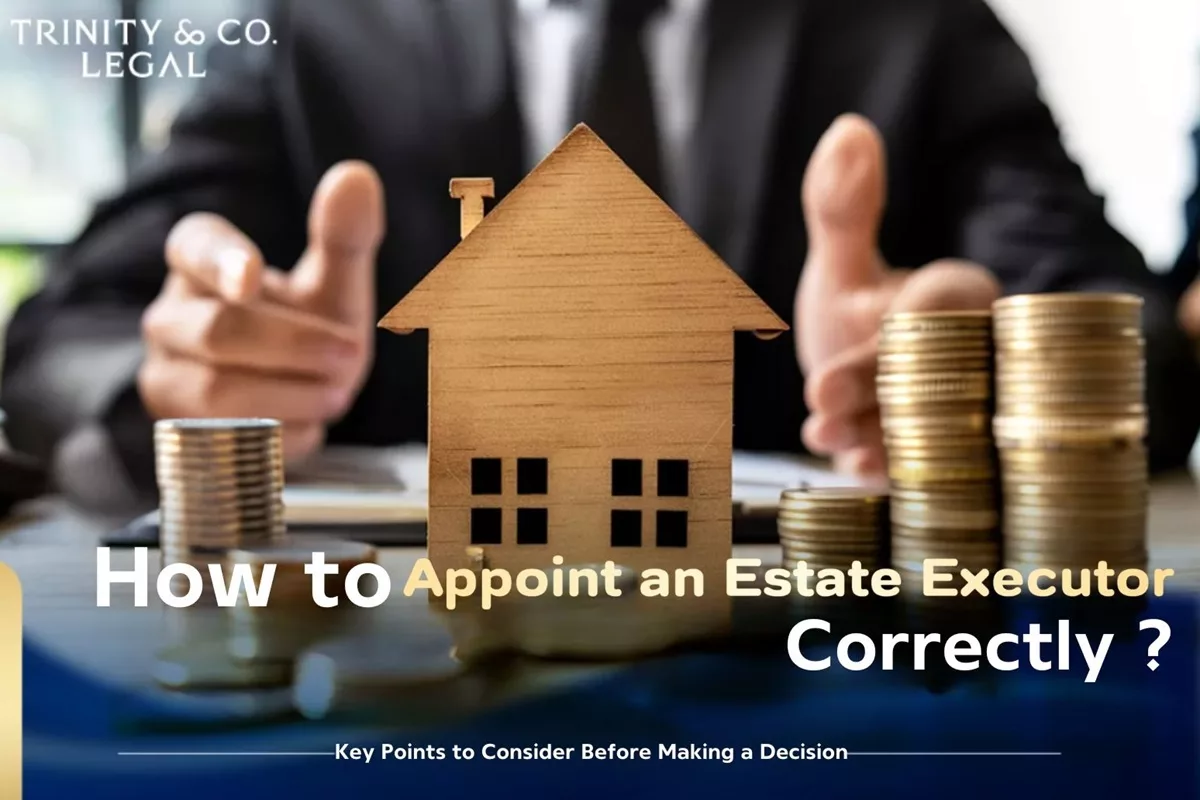Appointing an estate executor is a critical yet often overlooked process. The executor plays a vital role in managing and distributing the deceased’s assets in a proper, smooth, and equitable manner for all heirs.
Who Is an Estate Executor? A Role You Might Not Fully Understand
An estate executor is an individual assigned the responsibility of managing the deceased’s assets and liabilities as specified in a will. If there is no will, the court will determine a suitable person to serve in this role. Typically, an executor may include:
- The deceased’s children or descendants
- Close relatives
- Trusted individuals such as a lawyer or financial advisor
There can be one or multiple executors, but they must meet certain criteria:
- Be of legal age
- Not be mentally incapacitated or declared legally incompetent by the court
- Not be declared bankrupt
Who Has the Right to Request the Court to Appoint an Estate Executor?
The following individuals may petition the court to appoint an estate executor:
- Heirs
- Statutory heirs, categorized as follows:
- (1) Descendants, such as legitimate children
- (2) Parents
- (3) Siblings of the same parents
- (4) Siblings of the same father or mother
- (5) Grandparents
- (6) Uncles, aunts, or other immediate relatives
- Beneficiaries under a will
- Interested parties, such as co-owners of estate property, an unregistered spouse with joint assets, or creditors of the estate
- Public prosecutors
Responsibilities of an Estate Executor
An estate executor holds significant responsibilities, including:
- Asset Inventory
They must identify and gather all assets of the deceased—real estate, bank accounts, businesses, and other properties—to facilitate fair distribution. - Debt Settlement
The executor must settle the deceased’s debts according to the legal priority. Neglecting to settle debts may result in legal action against the executor. - Estate Accounting
The executor must maintain clear and detailed records of income and expenses within the estate for all heirs to review. - Asset Distribution
Once debts are cleared, the executor will distribute the remaining assets to the heirs as outlined in the will or according to the order of inheritance under the Civil and Commercial Code, Section 1629. - Inheritance Tax Filing
The executor is responsible for accurately calculating and filing inheritance taxes in compliance with legal requirements. - Legal Representation
If disputes or issues arise concerning the estate, the executor must represent the estate in legal proceedings.
Why Appointing an Estate Executor Is Crucial
- Conflict Prevention
An executor helps minimize conflicts among heirs by serving as a neutral party to manage and distribute the estate. - Efficiency
The presence of an executor ensures that estate management processes proceed swiftly and efficiently. - Legal Compliance
An executor knowledgeable in estate law ensures that assets are managed and distributed in strict accordance with the law. - Accountability
Executors are accountable for their actions and must manage estate assets transparently and fairly.
Selecting a trustworthy executor is, therefore, a vital step. Consider their integrity, capability, and reliability—or consult a legal professional to ensure proper management of the estate.
Steps and Documents Required for Appointing an Estate Executor
Steps to Appoint an Estate Executor:
- Examine the Will
Check whether the deceased left a will naming an executor to handle their estate after passing. - Select an Executor
If no executor is named or there is no will, choose a reliable, capable person trusted by the majority of the heirs. - Submit a Petition to the Court
Eligible individuals, such as heirs or interested parties, must file a petition in the court within the jurisdiction of the deceased’s domicile.- Include details of the deceased, assets requiring management, and the proposed executor’s name.
- Notify Relevant Parties
The court will summon interested parties, such as heirs or other eligible individuals, to participate in the hearing. - Court Hearing
The petitioner and relevant witnesses must provide reasons and evidence supporting the appointment of the proposed executor.- The court reviews documents and assesses transparency, typically concluding proceedings within 45–60 days, though complex cases may take longer.
- Court Order of Appointment
If no objections or complications arise, the court will issue an order appointing the executor and provide certification documents.
Documents Required:
- Documents related to the deceased
- Asset documentation
- Petitioner’s identification and relevant legal documents
- Any additional necessary paperwork
Tips to Avoid Issues
- Ensure Document Completeness
Verify all required documents before filing the petition. - Consult Legal Professionals for Complex Cases
Seek advice if there are disputes among heirs or other complications. - Verify the Will’s Validity
Ensure the will is legally valid before proceeding.
Proper preparation and adherence to these steps can facilitate a smooth and trouble-free estate executor appointment process.
Legal Liability of Estate Executors
An estate executor may face legal consequences if they fail to fulfill their duties, such as:
- Concealing assets from heirs
- Misappropriating assets for personal use
- Ignoring the distribution of assets among rightful heirs
In such cases, heirs or interested parties may request the court to remove the executor.
Legal Penalties:
- Criminal Liability:
Misappropriating estate assets may result in imprisonment for up to five years or a fine of up to 100,000 baht (Criminal Code, Section 354).
Example Court Rulings:- Supreme Court Decision No. 113/2535
- Supreme Court Decision No. 532/2553
- Supreme Court Decision No. 2031/2566
- Civil Liability:
Executors may be held liable for damages if negligence is proven (Civil and Commercial Code, Section 812).
In cases of misconduct, the court may appoint a new executor to ensure proper estate management.
If you face estate-related challenges or wish to plan ahead, our experienced legal team at Trinity & Co Legal offers comprehensive legal services to guide you through this sensitive process, ensuring peace of mind and smooth estate management for you and your family.
Interested in Legal Services? Get in touch!
Trinity & Co Legal Co., Ltd.
contactus@trinitycolegal.com
096-798-6396
Facebook: Trinity&co Legal


